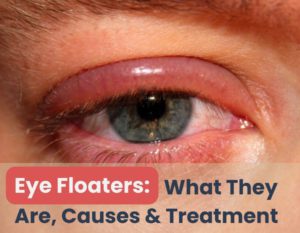
Eye floaters, those tiny specks that drift across our field of vision, are a common phenomenon that many of us have experienced at some point. While these floaters are usually harmless, they can be a source of concern and curiosity. In this comprehensive guide, we will delve into the world of eye floaters, exploring what they are, their causes, and the available treatments.
What are eye floaters?
Eye floaters are tiny particles or debris suspended in the vitreous humor, the gel-like substance that fills the eye between the lens and the retina. They cast shadows on the retina, creating the illusion of floating specks in your vision. The most common causes of eye floaters include age-related changes, inflammation, and eye injuries. As the vitreous humor undergoes changes over time, it may shrink or become more liquid, leading to the formation of floaters.
Causes of eye floaters
Age-related Changes: The most common cause of eye floaters is the natural aging process. As we get older, the vitreous gel in the eye becomes more liquid, leading to the formation of floaters.
Eye Inflammation: Inflammation in the eye, whether due to infection or other conditions, can contribute to the development of floaters.
Eye Injuries: Trauma to the eye can cause the release of debris into the vitreous, resulting in floaters.
Retinal Detachment: In more severe cases, retinal detachment can cause sudden onset of floaters and requires immediate medical attention.
Diabetic Retinopathy: People with diabetes may experience floaters due to the damage to blood vessels in the retina.
What is the best treatment for eye floaters?
Observation and Lifestyle Changes: In many cases, eye floaters are harmless and may not require immediate treatment. Simple lifestyle changes, such as staying hydrated and adopting a healthy diet rich in antioxidants, may help improve overall eye health.
Vitrectomy: An eye doctor who specializes in the retina and vitreous (the gel-like part inside your eye) can perform a surgery called vitrectomy. During this procedure, they remove the vitreous through a small cut and replace it with a solution to keep your eye in the right shape. It’s important to know that this surgery might not get rid of all the floaters, and you could still get new ones afterward. There are some risks with vitrectomy, like the possibility of infection, bleeding, or tears in the retina. Always talk to your doctor about the pros and cons to decide if this is the right choice for you.
Laser Therapy (Laser Vitreolysis): A non-invasive option, laser therapy aims to break down floaters into smaller pieces, making them less noticeable. This procedure is gaining popularity for its minimal risks and quick recovery.
Medication: Some medications are being explored for treating eye floaters, with research focusing on developing pharmacological solutions to dissolve or reduce the visibility of floaters.
Natural Remedies: Certain natural remedies and eye exercises are believed to alleviate eye floaters. While their effectiveness varies, some individuals report improvement through practices like eye massages and specific eye movement exercises.
